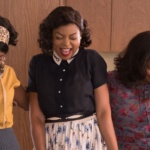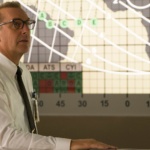A photograph during the closing credits of the Oscar-nominated Hidden Figures symbolises the challenges faced not only by the three characters who form the spine of director Theodore Melfi (St. Vincent) and his co-writer Allison Schroeder’s movie adaptation of Margot Lee Shetterley’s non-fiction book of the same name subtitled The Story of the African-American Women Who Helped Win the Space Race, but also the three actresses who portray them: Taraji P. Henson as mathematician Katherine Johnson, Janelle Monáe as engineer Mary Jackson and the Oscar-nominated Octavia Spencer as supervisor Dorothy Vaughan.
Shot from the inside of a department store, the lens is focussed on a group of black schoolgirls on the outside looking in at an array of white mannequins sporting the latest fashion. An image which symbolises the two main themes of the film, white supremacy and the objectification of women, which stood in the way of the real-life characters as they fought against the twin evils of racism and sexism in order to reach the top of their chosen fields. The very same barriers faced by actresses such as Henson, Monáe and Spencer who work in a Hollywood studio system which historically has produced work of, by and for white men of a mature vintage.

The times, they say, are a-changing. But given that this is the first time in the 89-year history of the Oscars that there has been a black nominee in every single acting category (Best Actress: Ruth Negga; Best Supporting Actress: Viola Davis, Naomie Harris and Octavia Spencer; Best Actor: Denzel Washington; Best Supporting Actor: Mahershala Ali), the changes have been a long time in coming and the struggle is far from over. Hence Katherine’s feisty response to her patronising wooer and future husband Jim who expressed surprise that NASA trusted women to work in the “heady” fields of mathematics and science: “Yes, they let some women do some things at NASA, Mr Johnson. And it’s not because we wear skirts, it’s because we wear glasses.”
The personal is indeed political for the film’s three protagonists. Katherine Johnson (Taraji P. Henson) is forced to drink from a coloured-only kettle and “walk to Timbuktu” to relieve herself at the nearest coloured-only toilet in a NASA building which initially barred black women from occupying senior positions but over fifty years later was renamed in her honour. Dorothy Vaughan (Octavia Spencer) is constantly overlooked for promotion because as her dry-as-a-bone boss Vivian Mitchell (Kirsten Dunst) put it: “That’s NASA for you: fast with rocket ships, slow with advancement.” Thankfully, her hard work, talent and perseverance were awarded with her appointment as the space agency’s first black Supervisor.
And Mary Jackson (Janelle Monáe) is initially prevented from fulfilling her childhood dream of becoming an engineer on the grounds that “NASA doesn’t commission females” for the training programme and even if they did the education requirements have changed. “Every time we have a chance to get ahead,” she complains, “ya’ll move the finish line.” But like Katherine and Dorothy, who in the words of Pharrell Williams’ track Runnin’ “don’t want no free ride” and are “just sick and tired of runnin’”, Mary refuses to take no for an answer and goes on to become NASA’s first female engineer – of any colour.

The politics of the civil rights movement, racial segregation and systematic discrimination against women and African-Americans are put front and centre in Theodore Melfi’s fine film along with NASA’s ground-breaking mission to orbit the earth with a manned rocket and JFK’s dream that space, the moon and the planets beyond are not “governed by a hostile flag of conquest, but by a banner of freedom and peace.” But the domesticity of the women’s lives and the humorous manner in which they deal with adversity lightens what on the surface is a dry, dense and deadly serious subject matter. A lightness of touch which is reflected in one of the film’s earliest scenes when an old-school cop is sweet-talked into escorting them to work: “Three coloured women are chasing a white police officer down the highway in Hampton, Virginia, 1961,” says an astonished Mary to her equally astonished fellow passengers. “Ladies, that there is a God ordained miracle!”
Kevin Costner offers solid support in his goody two-shoes everyman role as Al Harrison, director of the Space Task Group responsible for managing America’s manned spaceflight programme. “We all get to the peak together or we don’t get there at all,” he says after ripping down the coloured-only toilet sign and ripping off the coloured-only sticker from an office kettle. And composers Hans Zimmer (Interstellar, 12 Years A Slave), Benjamin Wallfisch (Lights Out) and the aforementioned Pharrell Williams compliment their upbeat compositions with a selection of classic tracks from black artists including Sticks and Stones by Ray Charles and So What by Miles Davis. And “So what?” should be our response if all four Best Actor awards at this years’ Oscar ceremony are won by black actors. For in the words of Martin Luther King, they should “not be judged by the colour of their skin but by the content of their character.”
Video Courtesy of: 20th Century Fox
[imdb id=tt4846340]
- REVIEW: Orphans @ Edinburgh King’s Theatre
- 13th April 2022
- REVIEW: Everybody’s Talking About Jamie @ Edinburgh Festival Theatre
- 30th March 2022
- REVIEW: Sheila’s Island @ Edinburgh King’s Theatre - 2nd March 2022










